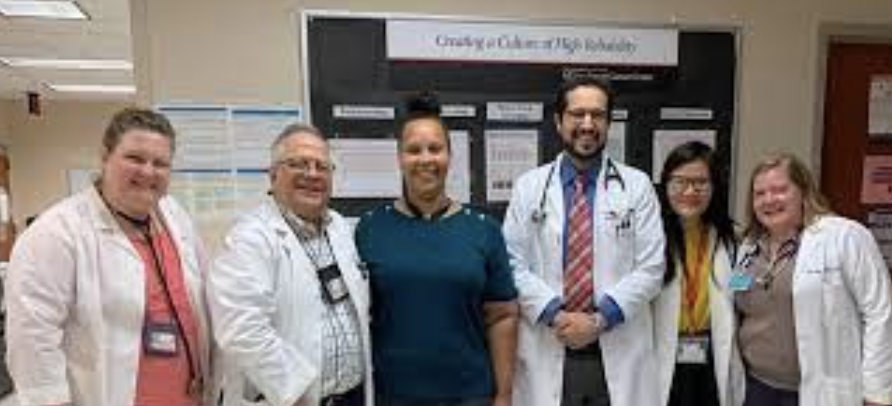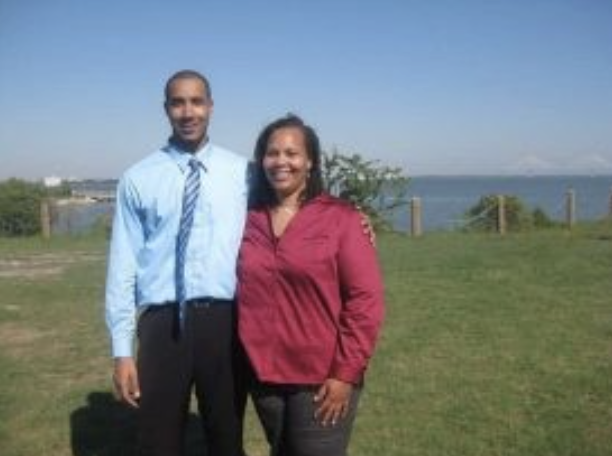RMC Patient Profile: Lamar Valentina Part 2
Read the first part of Lamar’s RMC journey here…
Part of Lamar’s cancer treatment occurred during the COVID-19 pandemic. He had to quarantine to keep himself safe, and it was scary to him at times. “But now that COVID-19 has subsided a little bit. It’s still around, I recommend doing some things that you enjoy. Don’t let cancer take away the joy that you still have. If you’re someone who’s active, maybe you just need to scale back on how active you are. Of course, you want to be safe. If you’re someone who likes to travel, find ways that you can still do it safely.”
Lamar found some activities that were helpful for him physically and mentally. “What helped me was being more involved in nature. I would do walks. I would sit outside and watch the clouds. I’d watch the stars at night. And I try to still continue to play basketball with my son. Obviously, he’s starting to get a little better than me. He’s getting bigger and faster, and I’m a little weaker. But I try to still do things that are fun and enjoyable.”
During part of COVID-19 restrictions, Lamar started missing the ability to do things, being self-sufficient, and even getting back into work. People asked why he was in such a rush to get back to work, but work helped him feel a sense of purpose. He felt like he had become a burden to his loved ones who had to cared for him. Lamar recommends striking a balance between accepting help and doing some things yourself. “Let others who want to help you actually help you. If you feel up to doing other things on your own, don’t shy away from that. Don’t let cancer take away a little bit of independence or a little bit of your purpose that you feel. I enjoy doing these PEN interviews, because I think we need that voice, and people shouldn’t shy away. Obviously, I’m not saying go out and be reckless. Be safe but try to do the things that bring you joy.”
People often tell Lamar that he looks so healthy and that he doesn’t look sick, which can be frustrating, since he wakes up with pains and has tumors all over. His biggest takeaway from this journey is how resilient he is. Lots of people tell him that he makes cancer look easy but don’t realize that it’s very difficult. “I just feel like life is short as it is. We all have an expiration date, and we don’t know when it’s going to come. And that’s the only thing guaranteed in life. For me, I really just feel like I want to live each day as if I’m trying to make a mark, at least be as happy as possible, chasing my goals and my dreams. I try to make sure with every encounter that I have with people that I’m not angry or bitter. I don’t want that to rub off on them, so I try to make sure that I greet everyone with a smile.”
If people don’t know specifically from his appearance since his eyebrows and hair are gone or know from someone else, Lamar prefers others to not know what he’s going through. “I don’t want people to feel sorry for me. Just treat me like a normal person, and hopefully I can pass on some positive energy and some happiness to everybody else regardless of what they’re going through to make it a kinder place here on earth.”
Lamar feels blessed about his overall quality of life. He’s at work and still travels for work as a flight chief in the Air Force. I’m not as physically active as I’d like to be. He’s doing chemo every three weeks, and will be starting radiation soon for a spot that’s remaining. The ultimate goal is to achieve no evidence of disease. He’s been in outpatient care for his entire treatment process and has been able to go to the hospital for chemo and then returns home and to work. “It’s been an absolute blessing that I cannot take for granted. But I still go through ups and downs. I have slight pains here and there. I’d love to be able to work out three to four days a week. But I’d rather take it easy and focus on my body healing from the inside out, and I’ll get back to working out more sooner or later.”
His biggest advice to renal medullary carcinoma (RMC) patients and cancer patients is don’t give up hope. “A lot of this fight is mental. Your body follows physically what you think mentally. So speak positive affirmations. Every day when you wake up even on the tough days, speak healing into your body. What you’re eating, whatever you’re drinking, it’s going to provide healing and substance. It’s going to rid your body of cancer. No matter how dark it looks or how dark it gets at any point, do not give up hope. Do not lose your spirit. Make sure you’re smiling and laughing and doing the things you love with the people you love.”
Lamar looks forward to ongoing research of RMC. “This has been a huge purpose added to my life. Anything I can do while I’m here, I’ll do it. I’m a big advocate for more support and more research for RMC. I know each day we’re getting closer to a cure, and hopefully this won’t impact families as negatively as it has in the past.”
What’s Lamar’s parting advice to other patients? “When you come out of the storm, you won’t be the same person that walked into it, that’s what the storm is all about. When you can’t control what’s happening to you, control how you respond to it, that’s where your power is.”





